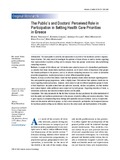| dc.description.abstract | Introduction: The Greek public is currently not represented at any level of the healthcare system’s organizational structure. This study aimed to investigate the opinions of Greek citizens as well as doctors regarding their representation in priority setting and to compare these two groups’ preferences when prioritizing competing resources.
Methods: A sample of 300 citizens and 100 doctors were asked by means of a standardised questionnaire: (a) whether their views should inform healthcare decisions; (b) to rank in terms of importance other groups that should participate in the process; and (c) to allocate competing resources to a series of alternative prevention programmes, medical procedures or across different population groups.
Results: As many as 83% of the citizens stated that their opinions should inform decisions regarding prevention and population-group programmes, while a slightly lower 70% believed their opinions should also be heard regarding medical procedures. However, when asked to rank six different population groups in terms of their importance, the public ranked their role quite low. Generally, doctors and patients, and their families were ranked highest, while politicians were ranked last by both groups. Regarding allocation of funds, a
remarkable consensus was observed between doctors and the public.
Conclusion: This study documents for the first time in Greece the clear preference for active involvement of both the public and healthcare professionals in the process of priority setting and resource allocation. There is great urgency in complementing these findings with qualitative research methods, such as in-depth interviews and discussions with focus groups, so that a more democratic, participative and transparent process for healthcare priority setting can be initiated, based on the actual needs and health problems of the public. | en_UK |


